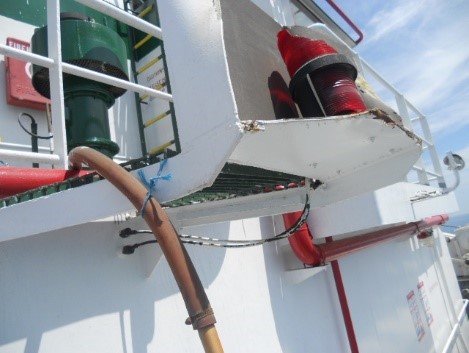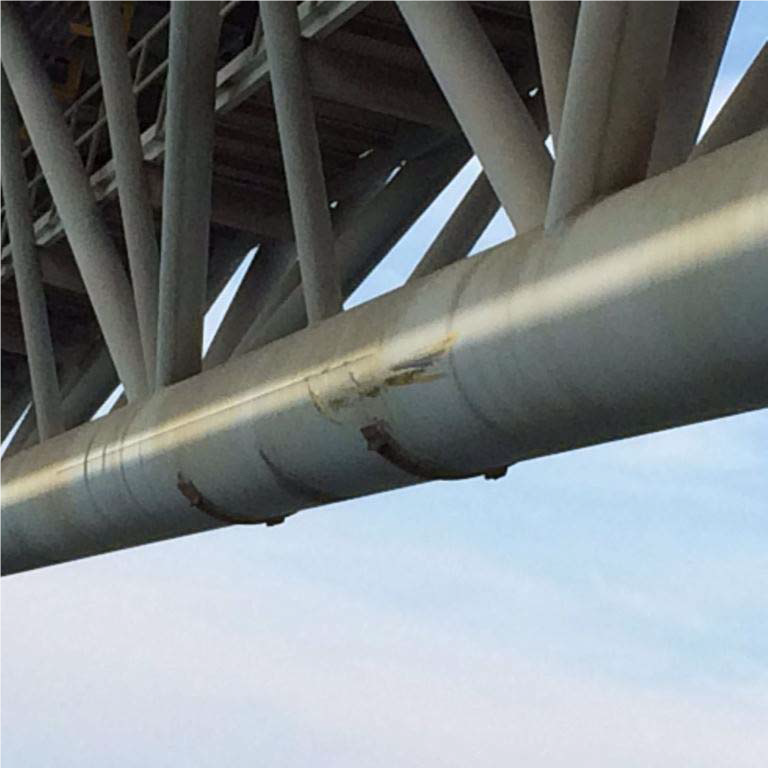Vessel activities near platforms – two incidents
A member has reported a number of incidents involving vessels working close to fixed platforms.
Incident 1: High potential near miss – vessel blackout on approach to platform
A DP1 anchor handling tug supply (AHTS) vessel experienced a blackout and lost all power to its thrusters during the approach to a platform. The vessel started drifting and due to environmental forces and current, fortunately moved away from the platform.
Our members’ investigation revealed the following:
- The immediate cause of the blackout was that the generators stopped due to an air lock in the fuel line, resulting in the generators tripping out;
- There was insufficient fuel in the day tanks;
- The fuel oil purifier was started without restoration of the fuel transfer system following bunkering. This caused Fuel to be drained from the day tanks into storage tanks, and tank low level alarms did not occur;
- There was inadequate handover/takeover of the watch. A post-bunkering checklist was not followed and, as a result, the fuel oil transfer system was not restored to the “normal” or sea-going condition;
- Freshwater transfer operations were carried out immediately without adequate completion or restoration of fuel systems;
- There was insufficient time allocated for smooth switching of successive operations, in particular, between fuel oil transfer and fresh water transfer to platform;
- The emergency diesel generator in this case did not come on load automatically and tripped upon starting due to a defective 24 V DC breaker;
- The root cause was determined to be failure to follow established procedures.
Our member took the following actions:
- Reiterated the importance of:
- toolbox talks and job safety analysis being conducted before bunkering operations, covering the following:
- all the anticipated risks and establishing safeguards to mitigate risks
- bunkering plan, procedures, and sequence of valve operations for each activity involved in the transfer;
- thorough handover/takeover between shifts and crews, particularly during critical operations;
- toolbox talks and job safety analysis being conducted before bunkering operations, covering the following:
- Appropriate notices outlining bunkering procedures, sequence of operations etc., to be posted in the engine room and near bunker manifolds;
- Extra attention to be paid to method of restoration of the fuel systems back to “normal” operation following bunkering or transfer;
- A nominated person (in this case, the 3rd engineer) to be responsible for starting and stopping fuel transfer and bunkering;
- Blackout drill to be conducted involving all concerned personnel, taking into consideration various possible scenarios, such as approaching platform, approaching jetty, approaching other moving vessel;
- Careful check of all aspects of automatic functioning of emergency generator.
Rather than draw members’ attention to blackouts and failure of generators or engines with different causes, in this case members may wish to refer to the following incident with similar causes (search words: procedure, handover):
- Dropped object fell from crane – Poor communication/lack of awareness/control of work[quote: “Improved communication – particularly at shift handover – between all parties would have raised awareness of the operation”].
Incident 2: Loss of control of vessel leading to collision with platform
During personnel transfer operations with another vessel, one vessel came into contact with a fixed platform. The port side rudder failed causing the vessel to drift towards the platform flare bridge, making contact and causing slight damage to the flare bridge and the vessel’s navigation lights.
The following points were noted:
- The vessel was attempting to come alongside another vessel to effect personnel transfer, in the vicinity of a fixed production platform;
- Control of the vessel was lost, due to failure of a pin in the port side rudder angle feedback unit;
- Sea currents caused the vessel to drift into and collide with the bottom side of the flare bridge, causing minor damage.


An important lesson on both cases is the importance of extra vigilance and appropriate care when undertaking operations in the 500-metre safety zone. Additionally, the following should be noted:
- Greater understanding and ownership of marine risk from an installation perspective;
- Strict operating discipline in compliance with established procedures and recognised operating limits;
- Better quality communications between installation and vessels.
Members may also wish to review Platform supply vessel involved in a near-miss whilst on location.
0
Safety Event
Published: 28 March 2017
Download: IMCA SF 07/17
IMCA Safety Flashes
Submit a Report
IMCA Safety Flashes summarise key safety matters and incidents, allowing lessons to be more easily learnt for the benefit of all. The effectiveness of the IMCA Safety Flash system depends on Members sharing information and so avoiding repeat incidents. Please consider adding safetyreports@imca-int.com to your internal distribution list for safety alerts or manually submitting information on incidents you consider may be relevant. All information is anonymised or sanitised, as appropriate.
IMCA’s store terms and conditions (https://www.imca-int.com/legal-notices/terms/) apply to all downloads from IMCA’s website, including this document.
IMCA makes every effort to ensure the accuracy and reliability of the data contained in the documents it publishes, but IMCA shall not be liable for any guidance and/or recommendation and/or statement herein contained. The information contained in this document does not fulfil or replace any individual’s or Member's legal, regulatory or other duties or obligations in respect of their operations. Individuals and Members remain solely responsible for the safe, lawful and proper conduct of their operations.
